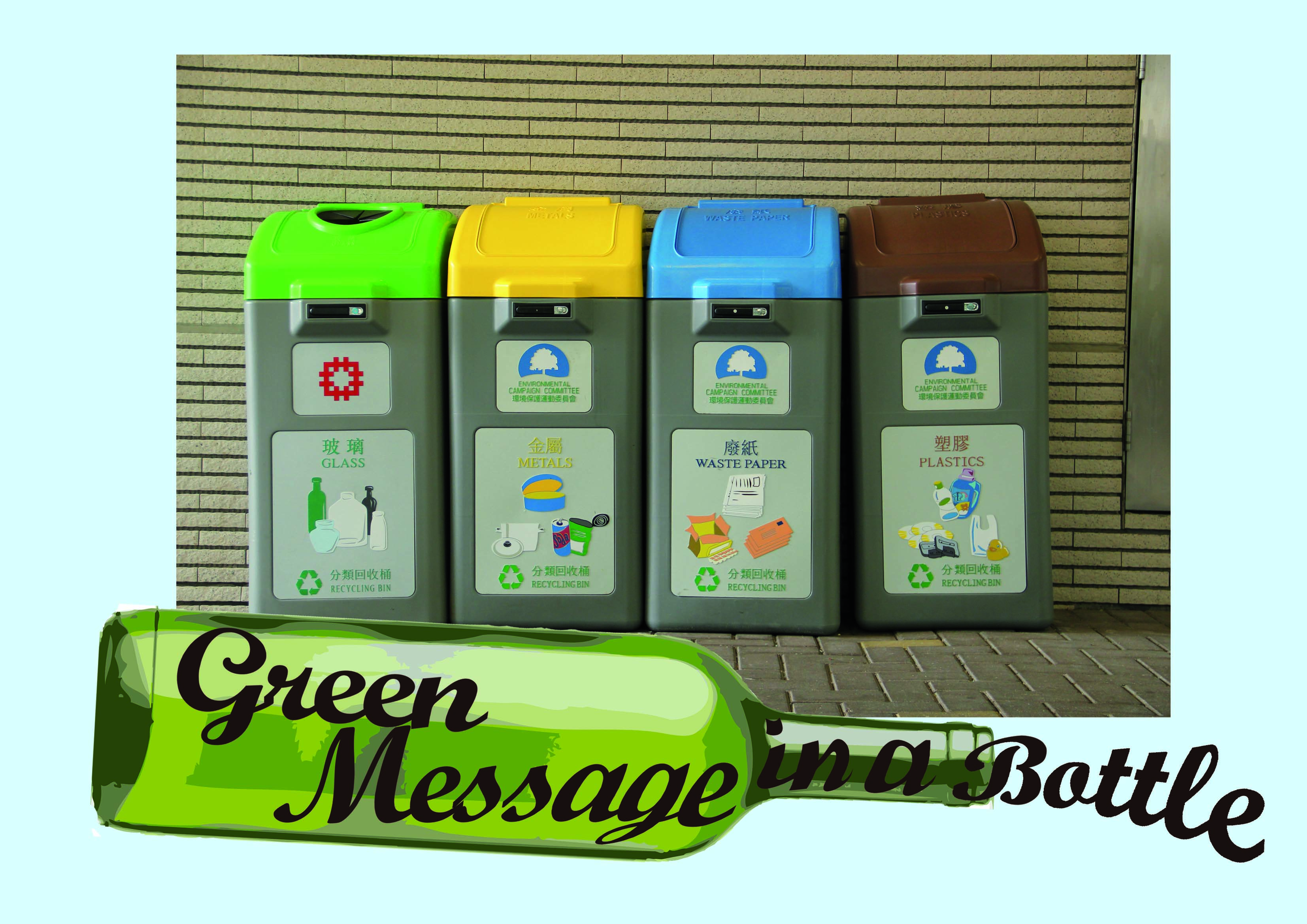Glass recycling finally gets going in Hong Kong
Reporters: Carmen Shih and Yvonne Yeung
Blue is for paper, yellow is for metals and brown is for plastics. Now there is a new colour for recycling bins – light green for glass bottles.
The new bins have been specially designed to receive empty condiment and drinks bottles as well as jam jars and other glass objects.
The first glass bins were introduced in January and they can be found alongside existing three-colour waste separation bins in six selected public rental housing estates in East Kowloon. They are part of a 12-month pilot programme to separate and recycle glass bottles collected from housing estates organised by the Environmental Protection Department (EPD) and the Housing Authority.
According to Alain Lam Kwok-lun, principal environmental protection officer of the EPD, the scheme is a good start for glass recycling in Hong Kong. “It would be best if glass could be locally produced, locally treated and locally used,” says Lam.
Although aluminium cans, paper and plastic bottles have been widely collected and recycled, there has been little interest in recycling glass in Hong Kong. This is because of the absence of a local glass manufacturing industry and the lack of a market for the used glass bottles.
In order to create a market and reliable outlet for recycled glass, the government funded the Hong Kong Polytechnic University to develop technology to produce eco-bricks from waste glass.
Eco-bricks are mainly made of fly ash, glass sand and recycled crushed stones. The glass sand replaces natural river sand as one of the raw materials. By using waste as a raw material, energy consumption can be reduced. The government’s goal is to reduce the territory’s energy consumption by 30 per cent.
And it is not just energy consumption that is a problem. Hong Kong’s landfills are filling up fast. Yet every day, the territory generates around 600 tonnes of waste glass bottles. In 2009, glass bottles accounted for four per cent of total solid waste. So the government needs to find ways to reduce the amount dumped into landfills.
The hope is to increase the recovery rate of all waste from 49 per cent to 55 per cent by 2015.
“After all, (waste reduction) is a subtraction,” Lam says, explaining why the government should take a leading role in expanding the market for waste glass.
An example is the government’s requirement that contractors use 100 per cent eco-bricks to win tenders for official projects. Eco-bricks have been used in various projects by the Highways Department, the Housing Authority, the EPD and local tertiary education institutions. “We have to encourage people to use or to buy eco-bricks at extra cost,” says Lam.
At present, there are two construction material companies producing eco-bricks and blocks. Besides eco-bricks production, waste glass bottles can also be washed and reused. Some hardware stores reuse them to hold solvents, while some condiment and sauce stores use them as containers for their products.
Waste glass bottles, which are usually seen as rubbish, can also be transformed and regenerated into pieces of artwork. In January this year, Green Glass Green, an initiative started by The Hong Kong Dumper Truck Driver Association, organised an exhibition at Oasis in Central, showing 47 pieces of glass artwork created by local secondary school students.
When combined with creativity, waste glass can be given a new lease of life as a musical instrument or home decoration. But the process of recycling the glass can also provide new hope and new skills to those involved.
Last November, the Wanchai District Council, the Hong Kong Police Force (Wanchai District) and the Methodist Centre jointly launched the Discarded Bottles Recycling Pilot Project.
Deputy District Commander of Wanchai District, Danko Au Yeung Chiu-kong says the aim of this project is to improve social order. There had been concerns about fighting and violent crime in an area where glass bottles littered the pavement, especially around bars. Local residents complained about the danger posed by shards of broken glass on the ground every morning, and about the noise caused by breaking glass and fighting.
“If we ignore the management, order and security in the street, this gives an impression that nobody is maintaining social order,” says Au Yeung.
Since the Discarded Bottles Recycling Pilot Project was launched, residents have reported that the situation has improved.
Under the scheme, four recycling bins were placed in the Wanchai bar area and four former young offenders were recruited to collect bottles from the area in the early hours of the morning.
In the past, these youngsters had been regarded as troublemakers who had poor relations with the police. Ironically, they now see the police as their protectors.
Norman Lo Kam-wah, general secretary of the Methodist Centre, the organisation that recruited and trained them, says the young men feel safe when they see officers patrolling the streets during their shifts between 2 a.m. and 4 a.m.. The youngsters seem to have learnt a lot from their new jobs.
Jackie, one of the recruits, appreciates the fact that he has more chances to speak English when he explains what they are doing to foreigners. “There is a sense of satisfaction,” he says.
Working in bar areas has taught the young men how to deal with drunk people, to stay calm and get on with their work. Jackie recalls they once came across a drunk man who mimicked their actions, picking up a piece of rubbish beside a glass bottle and throwing it at them. They could do nothing but continue their work.
Jackie has also learnt to be forgiving. Some people may ask him about what he and his partners are doing, whether they are paid to do it and some even ask if they are performing a Community Service Order. He says he always answers them politely because they may simply not understand their job.
Jackie’s team-mate Ah Fung has a full-time job in a printing shop so it is especially difficult for him to wake up early. He manages to do so because he does not want to be late for work. He says that it is a sense of responsibility.
Tommy, another team member says the most significant reward is the extra cash he can earn. He gets HK$120 per hour for helping to collect waste glass bottles. “I’d like to give some of my salary to my mum,” he says.
Brought together by glass recycling, the four former offenders have discovered a sense of community through their work.
They are not the only people to benefit from taking part in glass recycling. The Hong Chi Association, which works with people with intellectual disabilities, has launched a three-year Glass Bottle Recycling Campaign. Its goal is to reduce waste and provide job opportunities for Hong Chi trainees.
The trainees are divided into small groups and some are designated as ambassadors to promote the campaign in road shows and in schools.
One of the trainees Hui Yuk-po, follows the project van to different collection points to haul recycle bins full of glass bottles. He takes them back to Hong Chi’s Fanling unit for rinsing and delivers them to the eco-brick factory in Clearwater Bay.
Hui enjoys his duty and even considers rinsing glass bottles to be an eye-opening experience. “I can see a lot of beautiful bottles that I have not seen before,” he says.
When the recycle bin is too heavy, he and his partner Chan Kai-lun, help each other to lift it up. They load and unload the recycle bins efficiently and safely, without the assistance of their instructor.
Apart from learning independence and team spirit, Chan has also improved his communication skills while interacting with the public to promote glass recycling. “I was shy and quiet before. I didn’t know how to express myself. Now, when I see strangers while I am working, I will greet them,” he says.
When the pilot programme on Source Separation of Glass Bottles in Housing Estates ends, the EPD will analyse its effectiveness to decide if it is possible to launch a territory-wide glass recycling campaign.
According to the EPD’s Alain Lam, the target of the pilot programme is to collect 250 tonnes of glass bottles a year.
“Just 14 to 24 tons of discarded glass bottles are recycled, which is only one per cent of the amount generated,” says Lam.
To tie in with the scaling up of glass recycling, the government plans to negotiate with China’s Ministry of Environment Protection, to allow washed, categorised and crushed glass to be exported from Hong Kong to the mainland.
Lam says discarded glass bottles can be used as raw material for glass production factories in the mainland, which has a larger market for glass.
However, the ultimate way to minimise waste production is to reduce consumption. The government is actively considering if there is a need to make glass recycling mandatory under the “user pays” principle.
It will require public discussion, interaction and citizens’ participation if glass recycling is to really take-off in Hong Kong, says Tony Wong Shek-chung, executive committee member of Hong Kong Dumper Truck Drivers Association and a sponsor of the Green Glass Green project.
“There must be some sacrifices when promoting environmental protection,” he says.











































